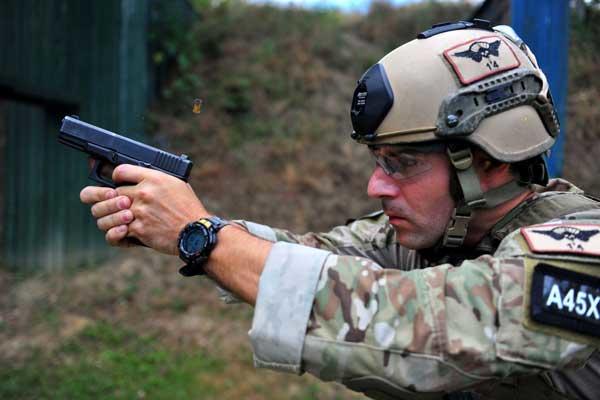The U.S. Army hasn't decided on "one handgun or another" as a replacement for the service's M9 pistol, according to Army public affairs.
The service in a statement Wednesday said it currently has no plans to buy Glock pistols as an alternative to the service's ongoing Modular Handgun System program.
Military.com ran a March 21 story describing Army Chief of Staff Gen. Mark Milley's recent frustration with the MHS program as an example of the Pentagon's bureaucratic acquisition system.
The story reported that, in addition to publicly criticizing MHS, Milley's office recently contacted Army Special Operations Command's G-8 office, which oversees fielding of equipment, to ask if there is room for the Army to join its pistol contract to buy Glock 19s, according to a source who asked to remain anonymous because he is not authorized to speak to the media.
Milley's office didn't respond to Military.com for comment.
On Wednesday, an Army spokesman at the Pentagon responded with the following.
"Because the Modular Handgun System program is currently in the source selection phase, the Army has not contacted Glock nor any other vendor with regard to their product offerings," Col. Patrick R. Seiber, chief of Army Media Relations Division, wrote in an email.
"Although the Army is the managing authority for SOCOM's handgun contract, no action has been taken to contact them about utilizing that vehicle to directly procure one handgun or another outside of the specified source selection process. The Army is dedicated to ensuring that all of its material capability requirements are met affordably and without prejudice."
The statement didn't specifically mention Milley.
The Army launched its long-awaited XM17 MHS competition in late August to replace its Cold-War era, M9 9mm pistol.
Milley has used recent public appearances to criticize federal acquisition guidelines that all services must follow when choosing and purchasing weapons and equipment, citing the MHS effort as a prime example.
During a March 10 speaking engagement at a conference in Washington, D.C., for instance, Milley criticized the program's two-year testing phase slated to cost $17 million, stating that as the chief of staff, he should have the authority to select and purchase the Army's next sidearm.
Milley has also asked Defense Secretary Ashton Carter to grant authority to the service chiefs to approve the acquisition of equipment that does not require new technology or research and development, the source said.
Under its contract, USASOC is buying Glock 19s from Glock Inc., based in Smyrna, Georgia, for a base price of $320 each. The same pistol retails for $500-$600 each.
The compact Model 19 is one of Glock's most popular handguns. The striker-fired, 9mm pistol features a four- inch barrel and has a standard capacity of 15 rounds, although 17-round magazines are available. The polymer frame features an accessory rail for mounting lights.
With USASOC'S price, the Army would pay about $91.8 million if the service were to buy 287,000 pistols, the quantity requirement outlined in the MHS effort.
Currently, the MHS program is projected to cost about $350 million, Army officials maintain.
But choosing the Glock 19 would abandon one of the major goals of the MHS effort -- to adopt a pistol chambered for a more potent round than the current 9mm. The U.S. military replaced the .45-caliber 1911 pistol with the M9 in 1985 and began using the 9mm NATO round at that time.
Most special operations forces, however, use 9mm pistols and a new Defense Department policy that authorizes "special purpose ammunition" now allows the military to use expanding or hollow-point bullets, experts maintain.
-- Matthew Cox can be reached at matthew.cox@military.com.




























